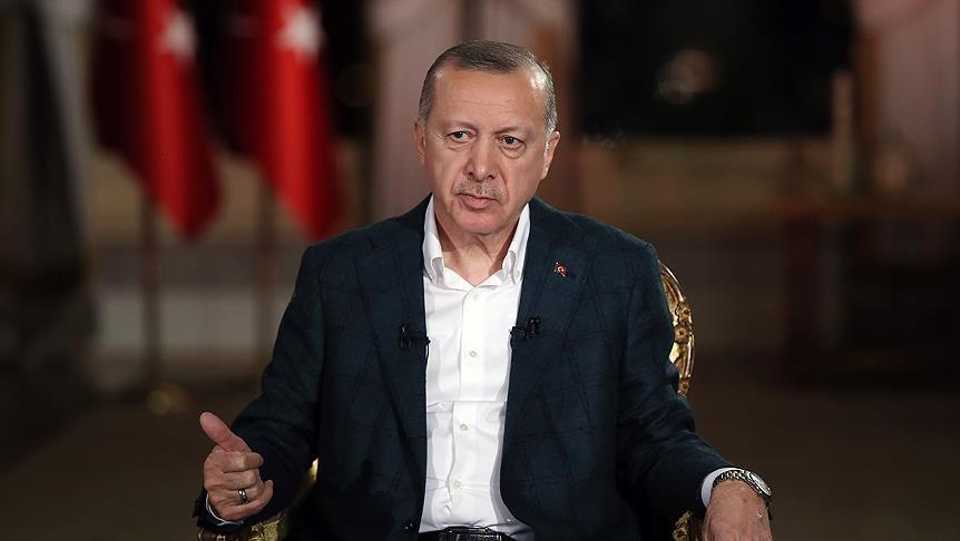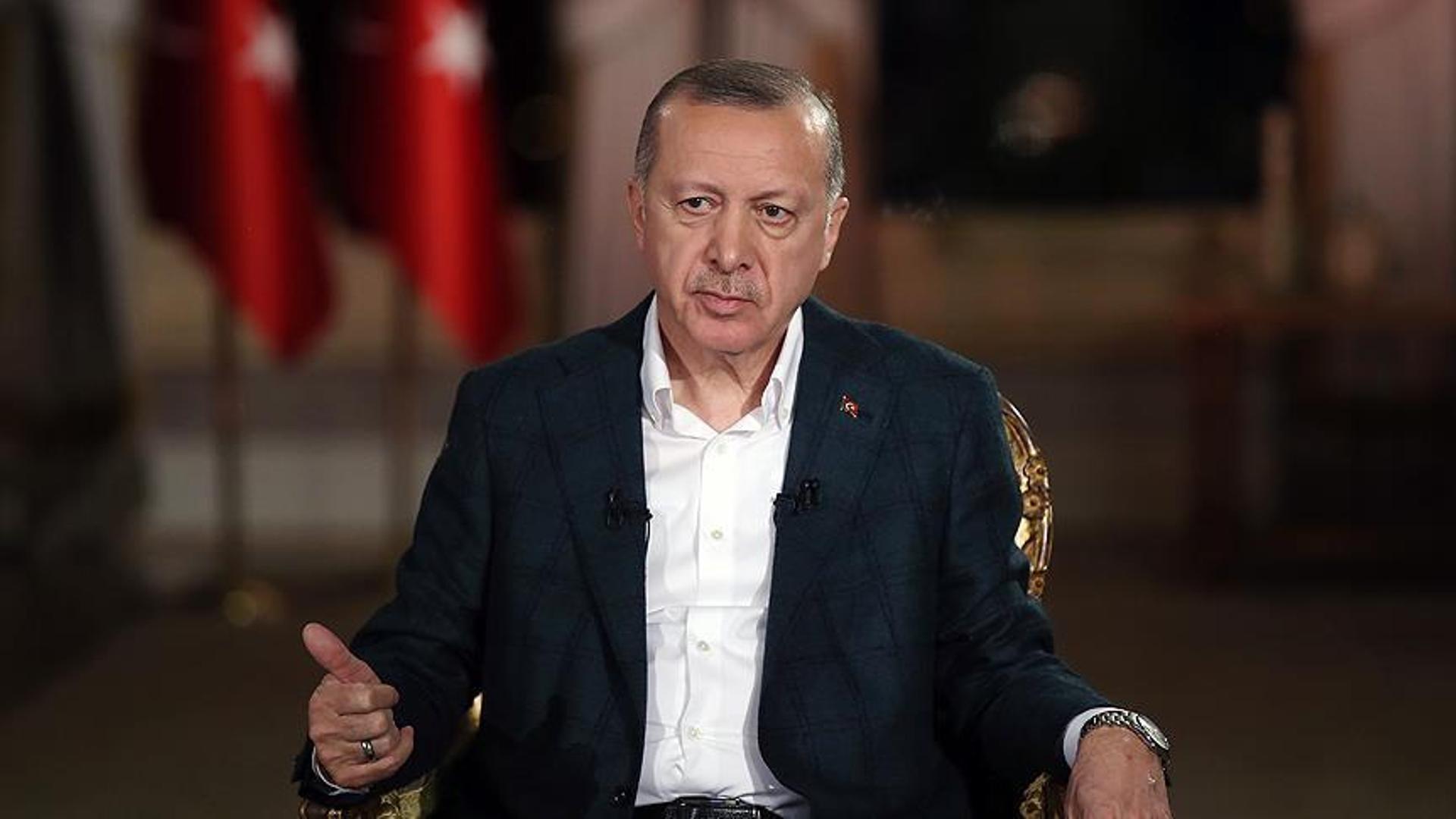
Turkey’s President Recep Tayyip Erdogan has asked the United States to handover the security of a proposed safe zone in northeastern Syria to Turkish troops.
Ankara has pushed for a 32 kilometre (20 mile) security corridor on the Syrian side of the 900-kilometre Syria-Turkey border in a bid to keep YPG terrorists from carrying out cross-border attacks.
“We can provide the security in the area. We can manage the region together with you,” Erdogan said on Sunday in an interview with TRT Haber.
“No problem there. But we can’t leave the region for coalition forces.”
Erdogan showed the negotiated “security zone” on the map, during the live broadcast, which he said would stretch from Jarabulus in northern Syria to the Iraqi border.
Erdogan said he hoped Washington would pull out its troops out of Syria soon.
If not, he warned, Ankara would take action to avert the possible terror threat posed by the YPG, which the US has backed for its own goals in Syria.
“I hope (the US) will complete (the pullout) in a short period of time because we do not want to live under threat,” Erdogan said.
“Whenever we see any sign of a threat, we will do whatever is needed,” he said.
Turkey welcomed a surprise announcement in December by US President Donald Trump that he was pulling around 2,000 American troops from the war-torn country.
That has prompted Turkey to put on hold its plans to launch a military operation in Syria to drive out the YPG, the Syrian branch of PKK, a terrorist organisation responsible for killing of thousands of people in Turkey.
The silencing of Jamal Khashoggi
Erdogan also spoke about the murder of Saudi journalist Jamal Khashoggi, saying the perpetrators must be held accountable.
The Turkish President said he has also listened to the audio tapes of Khashoggi’s murder and “cannot understand the United State’s silence” on the issue.
“We want everything to be clarified because there is an atrocity, there is a murder,” Erdogan said.
“The Khashoggi murder is not an ordinary one.”
Erdogan said Saudi Arabia must provide answers regarding 22 people responsible for Khashoggi’s death including 15 people who had arrived in Turkey around the time of the journalist’s killing.
Khashoggi, a Washington Post contributor and Saudi regime critic, was murdered at the Saudi consulate in Istanbul on October 2 last year.
He visited the consulate to obtain paperwork for his upcoming marriage to a Turkish woman.
Turkey says Khashoggi was killed by a team of 15 Saudis who strangled him at the kingdom’s diplomatic mission.
Riyadh, after denying the killing for two weeks, eventually described it as a “rogue” operation but denied any involvement by Crown Prince Mohammed bin Salman.
The case has caused strains in the kingdom’s ties with Washington.
Turkish officials are seeking answers from Saudi Arabia to a number of questions including who order the hit, and the whereabouts of Khashoggi’s body.
Unhappy with Riyadh’s cooperation in the investigation, Ankara has also called for an international inquiry.
A UN judicial expert investigating the murder met this week with Turkish authorities in Ankara and Istanbul and carried out inspections outside the Saudi consulate.
Eleven men are on trial in Saudi Arabia accused of involvement in the murder with the attorney-general seeking the death penalty for five of the defendants.
The second round of Sochi summit
Erdogan said he would meet his Russian counterpart on February 14 in the Black Sea town of Sochi.
“So we will start the second round of the summit in Sochi and, we will repeat the summit as a trio of the Russian Federation, Turkey and Iran. I wish that it will give a new meaning to this beautiful course, add new power. Because, this process in Syria, after Jarablus, Afrin and Idlib, all this is going better every day. It is our hope, that we should continue this way and, in these regions where the return has begun, the Syrian people should have the opportunity to return to their own land.” he said.
He underlined that Turkey’s policy on northern Syria focused on the territorial integrity of the war-torn country.
“We don’t advocate the fragmenting of the Syrian people,” Erdogan said.
Turkey currently hosts some 3.6 million Syrian refugees, according to estimates.
Noting that steps have been taken with Russia regarding patrols around the northern Syrian town of Manbij, Erdogan said a Turkish delegation had returned from Russia for talks on Syria which had resulted in “positive developments.”
“I hope this positive development will lead to the exit of these [terrorist] organizations leaving this place as soon as possible and its rightful owners will come and settle in their lands,” he said.
Ruling out any potential operation into the region in the near future, he criticized Washington’s failure to leave Manbij within 90 days as previously promised.
Referring to Turkey’s Operation Olive Branch in northwestern Syria liberating the region from YPG/PKK and Daesh terrorists, Erdogan stressed that had it not been for Turkey’s maneuver, these terror organizations would have been able to reach the Mediterranean Sea.
President Erdogan further underlined that Turkey’s policy on northern Syria focused on the territorial integrity of the war-torn country, adding that talks were being held at lower levels with the Syrian government.
“We don’t advocate the fragmenting of the Syrian people,” Erdogan said.
In its more than 30-year terror campaign against Turkey, the PKK – recognized as a terrorist group by Turkey, the US and the EU – has been responsible for the deaths of some 40,000 people, including women and children. The YPG/PYD is the group’s Syrian branch.
On his country’s fight against the Fetullah Terrorist Organization (FETO), Erdogan said as a result of the efforts of the FBI progress may be possible for the return of the group’s US-based leader Fetullah Gulen.










Discussion about this post